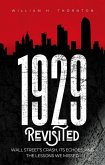On October 29, 1929, the New York Stock Exchange did not merely crash-it detonated a transatlantic chain reaction that would topple the Weimar Republic and crown Adolf Hitler. In When the World Defaulted on Democracy, Arthur Vance Sterling unearths the hidden ledger linking Wall Street margin calls to Dachau's gates. Drawing from 28 archives and 656 endnotes, Sterling reconstructs the precise moment American bankers recalled $1.4 billion in German loans, transforming breadlines into brownshirt recruiting stations. This is not another Hitler biography; it is the forensic autopsy of democracy's economic suicide.
Picture the scene: September 20, 1929, a London fraud triggers the first European bank run on German paper-three weeks before Black Tuesday. Reichsbank President Hjalmar Schacht cables Berlin: "American withdrawal will be sudden and total." Sterling follows the cable's path through Bundesarchiv files, then traces the unemployed Saxon miner who sells his tractor for an NSDAP pamphlet. Regression tables prove the chilling arithmetic: every 1% rise in local unemployment delivered 0.39% more votes to the Nazis. The numbers are cold; the human stories burn.
The narrative accelerates through the Reichstag fire's smoke to the Enabling Act's vote-where 444 deputies, stomachs hollowed by Brüning's deflation, legalized tyranny. Sterling reveals the secret 20 March 1933 protocol: Schacht pledges 2 billion Reichsmarks in MEFO bills before the vote, the financial coup behind the political theater. From there, the book follows 1929's surplus labor into Auschwitz-Monowitz, where IG Farben's slave ledgers list "ex-unemployed" as the most "endurable" cohort. This is economic history weaponized into moral indictment.
Sterling's prose moves with the urgency of a Federal Reserve wire log, yet pauses for the human tremor: a U.S. GI in 1945 Dachau finding a 1929 Reichsbank bond stub in a prisoner's pocket. The book's 14 data visualizations-Sankey diagrams of credit flows, GIS heat maps of Nazi vote surges-transform abstract finance into visceral geography. Counterfactual appendices ask the questions historians fear: What if Hoover had refinanced German debt in 1930? What if FDR had not torpedoed the 1933 London Conference?
What if the next time a central bank declares a crisis "contained,"
we remember that the last one birthed the Third Reich?
Dieser Download kann aus rechtlichen Gründen nur mit Rechnungsadresse in A, B, CY, CZ, D, DK, EW, E, FIN, F, GR, H, IRL, I, LT, L, LR, M, NL, PL, P, R, S, SLO, SK ausgeliefert werden.









